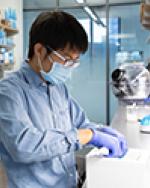
Research something you are passionate about. Don’t research something that you’re not interested in because you want to build your resume or you want to publish a paper. Passion really shows in research.
Please give a brief, simplified overview of your research project.
I am creating a library of olfactory receptors in a matrix form to create a method to diagnose diseases using the sense of smell. The matrix of olfactory receptors will produce data for the device to differentiate different smells using machine learning.
I am also investigating exosomes as a method for drug delivery to treat glioblastoma.
I am also analyzing the effect of a policy called Directing Change in California on the suicide rates across different ethnic, socioeconomic, LGBTQ+, and intersectional backgrounds.
Describe the tasks you engage in as part of your work.
I clone olfactory receptors from mice and express them in drosophila cells. I also manufacture exosomes from HEK cells and characterize them with proteins and analyze the CHKS dataset multimodally using STATA.
Describe what you thought college might be like before you came to UT. Did you consider research when thinking about college?
I thought I would be doing lots of wet lab research before I came to UT. However, due to COVID, many wet labs were closed as wet labs require you to come in person. I joined a lab that specialized in computational work instead, despite having zero coding experience. Although I was scared at first, I instantly became engrossed in the various projects I was in. Taking a chance with coding really paid off, paving a new road for me that I never would’ve imagined before coming to UT.
How did you get involved with your research project?
I got involved with my research project by emailing professors and through student organizations at UT like Texas Engineering World Health.
Do you see your project connecting with your plans for your future?
I see my projects connecting with my plans for my future as I wish to become an MD-PhD who incorporates research into the medicine I practice, developing novel solutions for previously untreatable illnesses.
Some people have the misconception that only sciences engage in research. What do you want those people to know about humanities research?
Humanities research is essential in directing social change. It shapes local and state policies to support the healthy development of adolescents.
What is the most interesting or surprising thing you’ve gotten to do for this project?
The best thing I’ve gotten to do for my projects is make my ideas tangible, creating something that has never existed in human history.

